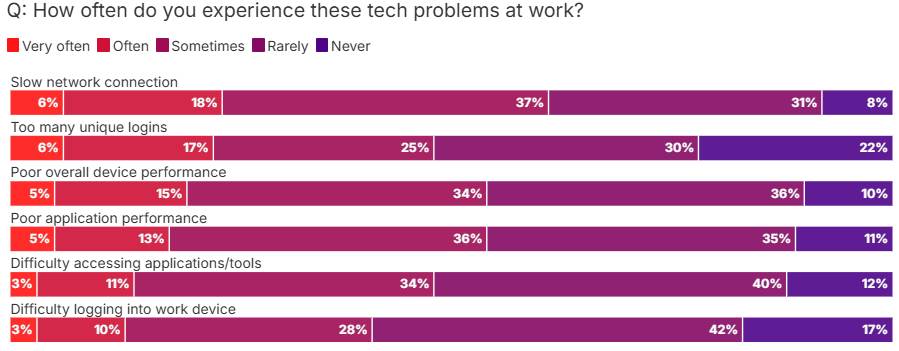The 2025 Digital Employee Experience (DEX) Report highlights a growing disconnect between how organisations perceive their digital maturity and the actual tech-related challenges faced by employees.
The report indicates that office workers experience an average of 3.6 tech interruptions and 2.7 security update disruptions each month. For a company with 2,000 employees, this equates to nearly $4 million in lost productivity every year. This financial impact underscores the urgent need for organisations to address digital friction within the workplace.

Source: 2025 Digital Employee Experience Report, McKinsey, 2025
Despite significant planned investments in AI, with 92% of companies intending to increase their AI spending over the next three years, Ivanti’s research shows that only 21% of office workers believe AI is significantly improving their productivity.
This suggests that digital friction is undermining the potential benefits of AI, exacerbating existing tech problems and negatively impacting employee output.
Furthermore, the report reveals that many employees are left to their own devices when it comes to learning new technologies. Nearly half of office workers report having to teach themselves how to use new tech, leading to frustration and inefficiency.
While 93% of companies have not banned AI use, only 40% have provided training, with another 24% planning to offer it soon. This lack of adequate training further contributes to the underutilisation of AI's potential.
Emphasising the importance of understanding the employee experience to unlock AI's true potential, Ivanti CEO Denis Kozak said: “As organisations accelerate their AI investments, it’s clear that realiding AI’s promise requires a deeper understanding of the employee experience and impact on productivity.”
He advocates for the use of Digital Employee Experience (DEX) solutions to monitor and analyse how employees interact with technology in real-time, revealing workflow bottlenecks and enabling proactive improvements.
The report also identifies a shift towards employee technology autonomy, with 65% of office workers reporting that frustrations with their tools negatively affect their mood and morale. While 67% believe having a say in the devices they use is important, only 36% currently enjoy this freedom.
Moreover, AI is transforming help desks, automating basic IT operations such as security patch management (72%) and IT ticket routing (67%). However, significant opportunities remain, with nearly 40% of companies still not automating password resets.



